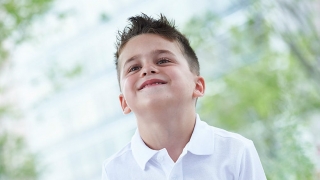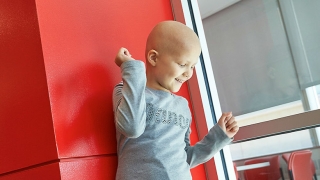Cancer Immunotherapy Research
The Cancer Immunotherapy Program at Children's Hospital of Philadelphia has several clinical trials available to qualified patients.
Humanized CART19 for High-risk Subsets of B-cell Acute Lymphoblastic Leukemia
Phase 2 study of humanized CD19-directed chimeric antigen receptor-modified T cells (huCART19) for very high-risk subsets of B-cell acute lymphoblastic leukemia (B-ALL)
To expand the potential of CD19 CAR T cells and improve outcomes for the highest risk patients, we are studying a humanized version of CTL019, called huCART19, as an alternative treatment approach, in newly diagnosed B-ALL patients predicted to have an exceedingly poor outcome with conventional chemotherapy (induction failure, persistent MRD after 2 cycles of frontline chemotherapy), in high-risk first relapse, and in second or greater relapse.
The study population will include pediatric and young adult patients (1-29 years) with relapsed/refractory CD19+ B-ALL, including patients who previously received CAR T cells and demonstrated poor response or persistence, evidenced by early B cell recovery.
This is a two cohort, open-label, phase 2 study. Subjects will receive a single dose of huCART19 cells, which are autologous T cells that have been engineered to express an extracellular single chain antibody with specificity for CD19 linked to intracellular activation and costimulatory domains (CD3z;4-1BB). Subjects will be monitored throughout the study for safety and efficacy assessments.
COG Frontline CAR T-cell Trial for High-Risk B-cell Acute Lymphoblastic Leukemia
AALL1721/ CCTL019G2201J (Cassiopeia): A phase II trial of tisagenlecleucel in first-line high-risk (HR) pediatric and young adult patients with B-cell acute lymphoblastic leukemia (B-ALL) who are minimal residual disease (MRD) positive at the end of consolidation (EOC) therapy
Tisagenlecleucel (chimeric antigen receptor T cells targeting CD19) in the first-line EOC MRD-positive setting may offer a therapeutic advantage for improved DFS and favorable benefit/risk profile. The primary objective of this clinical trial is to evaluate the efficacy of tisagenlecleucel therapy as measured by 5-year DFS rate after tisagenlecleucel infusion.
The study population will include pediatric and young adult patients (1-25 years) with de novo National Cancer Institute (NCI) HR B-ALL who are in first complete remission after first-line treatment and have MRD ≥ 0.01% at EOC by central laboratory assessment.
This is a phase II, single arm, open label, multi-center study. Subjects will receive a single dose of tisagenlecleucel cell product, which are autologous T cells that have been genetically modified ex vivo to target CD19 on the surface of B cells. Some subjects may be eligible for a second dose of tisagenlecleucel if certain protocol-specified criteria are met. Subjects will be monitored throughout the study for safety and efficacy assessments.
Pilot Study of Redirected Autologous T Cells Engineered to Contain Humanized Anti-CD19 Attached to TCRζ and 4-1BB Signaling Domains in Patients with Relapsed or Refractory CD19+ Leukemia and Lymphoma Previously Treated with Cell Therapy
This is a pilot study to evaluate humanized CD19 redirected autologous T cells (or huCART19 cells) in patients with relapsed or refractory CD19+ leukemia and lymphoma that was previously treated with cell therapy. This study is targeting pediatric patients aged 1-24 years with CD19+ B cell malignancies with no available curative treatment options (such as autologous or allogeneic stem cell transplantation) who have a limited prognosis with currently available therapies and were previously treated with a B cell directed engineered cell therapy product.
A Phase II, Single Arm, Multicenter Trial to Determine the Efficacy and Safety of CTL019 in Pediatric Patients with Relapsed and Refractory B-cell Acute Lymphoblastic Leukemia
This is a single arm, open-label, multi-center, phase II study to determine the efficacy and safety of an experimental therapy called CTL019 T-cells in pediatric patients with B-cell acute lymphoblastic leukemia, who are chemo-refractory, relapsed after allogeneic SCT, or are otherwise ineligible for allogeneic stem cell transplant.
A Phase II, Single Arm, Multicenter Trial to Determine the Efficacy and Safety of CTL019 in Pediatric Patients with Relapsed and Refractory B-cell Acute Lymphoblastic Leukemia
This is a single arm, open-label, multi-center, phase II study to determine the efficacy and safety of CTL019 in pediatric patients with r/r B-cell ALL.
Long Term Follow-Up of Patients Exposed to Lentiviral-Based CD19 directed CART Cell Therapy
The purpose of this study is to monitor all patients exposed to CD19 directed CAR T-cells (CD19 CART) for 15 years following last CD19 CART (e.g. CTL019) infusion to assess the risk of delayed adverse events (AEs), monitor for replication competent lentivirus (RCL) and assess long-term efficacy, including vector persistence.
A Pilot Study of Genetically Engineered NY-ESO-1 Specific (c259) T cells in HLA-A2+ Patients with Synovial Sarcoma
The purpose of this early (pilot) clinical trial is to test the effects (both good and bad) of chemotherapy and adoptive immunotherapy with T cells engineered to recognize NY-ESO-1 peptide in patients with unresectable, metastatic or recurrent synovial sarcoma.
Pilot Study of Non-Viral, RNA-Redirected Autologous T Cells Engineered to Contain Anti-CD19 Linked to TCRζ and 4-1BB Signaling Domains in Patients with Refractory or Relapsed Hodgkin Lymphoma
Pilot open-label study to estimate the feasibility, safety and efficacy of intravenously administered, RNA electroporated autologous T cells expressing CD19 chimeric antigen receptors expressing tandem TCRζ and 4-1BB (TCRζ /4-1BB) costimulatory domains (referred to as "RNA CART19") in Hodgkin lymphoma (HL) patients. Subjects will be treated with IV administration of RNA anti-CD19 CAR T cells for a total of six doses over 3 weeks.
Pilot Study of Autologous Anti-CD22 Chimeric Antigen Receptor Redirected T Cells In Pediatric Patients With Chemotherapy Resistant Or Refractory Acute Lymphoblastic Leukemia
This is a single center, single arm, open-label pilot study to determine the feasibility and safety of a single dose administered as spilt fractions of autologous T cells expressing CD22 chimeric antigen receptors expressing tandem TCRζ and 4-1BB (TCRζ/4-1BB) co-stimulatory domains (referred to as "CART22" cells) in pediatric patients with relapsed or refractory B-cell acute lymphoblastic leukemia.
A Phase 2, Two Cohort Study of the Tocilizumab Optimization Timing for CART19 (CTL019) Associated Cytokine Release Syndrome (CRS) Management in Pediatric Patients with CD19 Expressing Relapsed/refractory B-cell Acute Lymphoblastic Leukemia (ALL)
This is a phase 2, two cohort, open-label study to describe the efficacy of administration timing of tocilizumab on CART19 (CTL019) associated CRS safety events in pediatric patients with CD19 expressing relapsed and refractory B-cell acute lymphoblastic leukemia with high versus low pre-infusion tumor burden following redirected autologous T cells transduced with the anti-CD19 lentiviral vector (CART19/CTL019).

